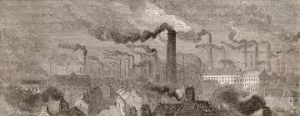Through French eyes: Victorian cities in the eighteen-forties viewed by Léon Faucher by Philip Morey
This article examines the motivation, scope, findings and reception of the survey of London, Liverpool, Manchester, Leeds and Birmingham which the French journalist Léon Faucher published in Etudes sur l’Angleterre (1843–5). Sources include Faucher’s letters, the original and revised text, the English translator’s notes, and reviews in the British, French and German press. Faucher’s fieldwork led him to question liberal orthodoxy and propose remedies to alleviate working-class distress. Exceptionally in eighteen-forties Britain, the continental socio-economic treatise was widely discussed and acclaimed. Elucidating Faucher’s thought and setting it in context illuminates the contrast between him and other writers, particularly Friedrich Engels.
Religion, politics and patronage in the late Hanoverian navy, c.1780–c.1820 by Gareth Atkins
Sir Charles Middleton, Lord Barham (1726–1813), occupies a pivotal place in naval history. His evangelical religiosity is well known, but while considerable attention has been given to how this shaped his administrative reforms, his manipulation of patronage to promote his co-religionists has, until now, been ignored or brushed under the carpet. This article uses contemporary correspondence, diaries and printed works to reconstruct for the first time a powerful nexus that bound Pittite politicians to Wilberforce and his circle, one that spanned parliament, the church, naval administration and the seagoing officer corps. In doing so it throws new light on how evangelicals gained such a strong foothold in late Hanoverian public affairs.
An unrealized cult? Hagiography and Norman ducal genealogy in twelfth-century England by Ilya Afanasyev
This article traces the adoption and ideological uses of the image of the pious Norman dukes in four consecutive hagiographical texts written in twelfth-century England. While this is a well-known topos of the earlier Norman tradition, its reception in England has been neglected in the existing scholarship. The article also examines further evidence of an interest in pious Norman dukes under Henry II, focusing on the translation of the remains of Richard I and Richard II at Fécamp in Normandy in 1162 and discussing whether the dukes’ official cult could have been established. The conclusion situates the material in the general context of the development of the cults of lay rulers in twelfth-century Europe and sheds light on the interplay between hagiography, historical memory and politics at the time.

